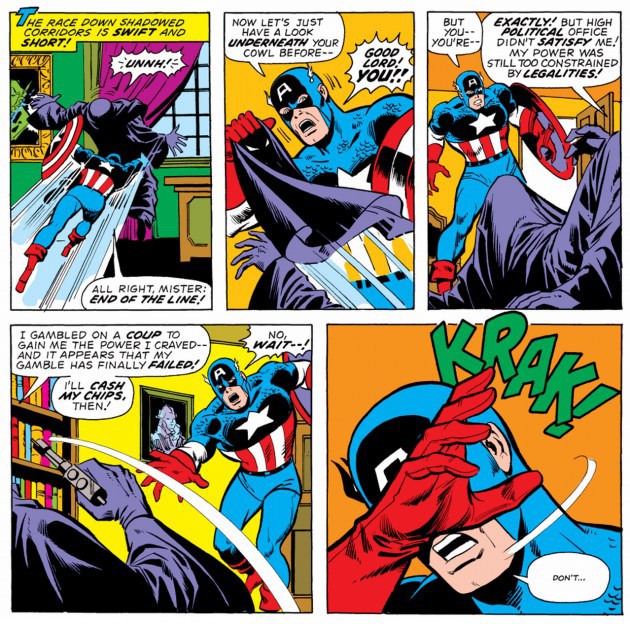LordOfLore
Banned
By Polygon.
A quote from it:
In 1974, America was gripped by the Watergate scandal, as President Richard Nixon was accused of criminal acts involving breaking-and-entering and a subsequent cover-up. At the same time, legendary comic creator Steve Englehart was working on Captain America and The Falcon with Sal Buscema. The two decided that such a monumental moment in American history could not go unremarked upon by Captain America: that the overwhelming feelings of distrust and uncertainty had to be incorporated into their superhero stories.
Englehart and Buscema came up with a story that might sound familiar if youre reading Marvel Comics at the moment. It was called Secret Empire, and featured Captain America uncovering a vast conspiracy after a string of attack ads question his fitness to serve as the Sentinel of Liberty. The story is as comic-booky as they come, with the titular Secret Empire planning on using a literal wheel of mutants in their scheme, but it ends in a way that is shocking to this day. Captain America chases the leader of the conspiracy into the Oval Office, where he is unmasked and commits suicide.
We never see the face of "Number One," but the implication is clear; Richard Nixon, or at least the Marvel Universe equivalent of Richard Nixon, was leading the Secret Empire. The metaphor couldnt be more obvious. Steve Rogers just unmasked the President of the United States as a supervillain and watched him die inside the White House. The Captain America comics following Secret Empire led to a period of self-discovery for a disillusioned Rogers as he quit fighting crime under the name Captain America, taking up the identity of Nomad. Subsequent stories examined the line between being a patriot and being loyal to the government, as many classic Captain America stories do.
The current Secret Empire by Nick Spencer, Rod Reis, Steve McNiven, Andrea Sorrentino, et al. doesnt share much in common with its predecessor. It doesnt examine the real world consequences of corrupt officials, it doesnt critique real world analogues of notable and controversial political figures and it doesnt even feature the Secret Empire.
I had the chance to chat with Steve Englehart this Monday evening about his work on the original story, what it is like to create stories about a corrupt and criminal president while a scandal was unfolding in front of the American people and what opinions, if any, he has about the current story that shares its name.
A quote from it:
I wanted to start by talking to you about your work on the original Secret Empire storyline in 1974, because one of the most fascinating things about it is that it was produced and published in its entirety before President Nixons resignation. What was it like working on that story during that era?
Englehart: I think it was pretty clear that the presidency was going to come to an end, I cant say I was a great political prognosticator, but the overall deal was that Watergate pretty much consumed America. This was in an era where there were only three television networks and all of them were covering the hearings that were being held on Nixons White House. The people that were conducting these hearings were politicians on both sides of the aisle who took their jobs seriously, so even people of the presidents party were investigating it seriously. So it was a legitimate enterprise that was being played out like a political thriller on television in front of the populace. That summer, everyone in America was riveted to this, and the interesting thing about it, too, was how it unfolded like a novel; if it got to a point where maybe Nixon might be able to get away with it, some new piece of evidence might appear.
So everybody was involved, and I was writing Captain America and I thought Theres no way Captain America could not react to something this momentous in America if the Marvel Universe was supposed to be the real universe.
So I came up with my disguised version of the situation, much simpler than the actual situation, but it was a storyline that would cover the feel of the whole thing. Then because it was a simpler situation I was able to bring it to a conclusion faster than reality could bring its part of it to a conclusion. As I said, the conclusion seemed obvious. He didnt resign for a long time after that, but the conclusion seemed obvious with the evidence that had been presented at that point so thats the direction that I took my story.

